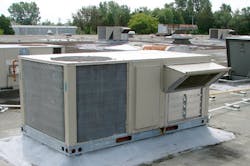Washington State Energy Code updates include dedicated outdoor air system requirements
Upcoming changes to the Washington State Energy Code are expected to include requirements for dedicated outdoor air systems.
The updates will alter how engineers and architects approach design, writes Max Wilson, a senior energy analyst for Glumac. “Designers are now required to decouple the heating and cooling system from ventilation systems,” Wilson says. “According to the new code language, HVAC systems should now include ‘supply-air temperature controls that automatically reset the supply-air temperature in response to representative building loads, or to outdoor air temperatures.’”
Heating and cooling equipment, because they have been historically linked, have become major sources of wasted energy by pushing fans unnecessarily hard to maintain optimum comfort levels. The new approach will greatly reduce overcooling or overheating interior spaces, Wilson says, and mitigate wasted fan energy.
Another code update requires design teams to choose a minimum of two prescribed of several energy-efficient design strategies. The focus on these “seems to be on reduction of both lighting loads and fossil fuels usage,” Wilson writes. “The code updates focus on enhanced lighting controls, a 25% reduction in lighting power, on-site renewable energy, and high-efficiency domestic hot water sources for 60% of the load (e.g. waste heat recovery or solar hot water systems).” The state’s next group of code change proposals is due in March 2017.
